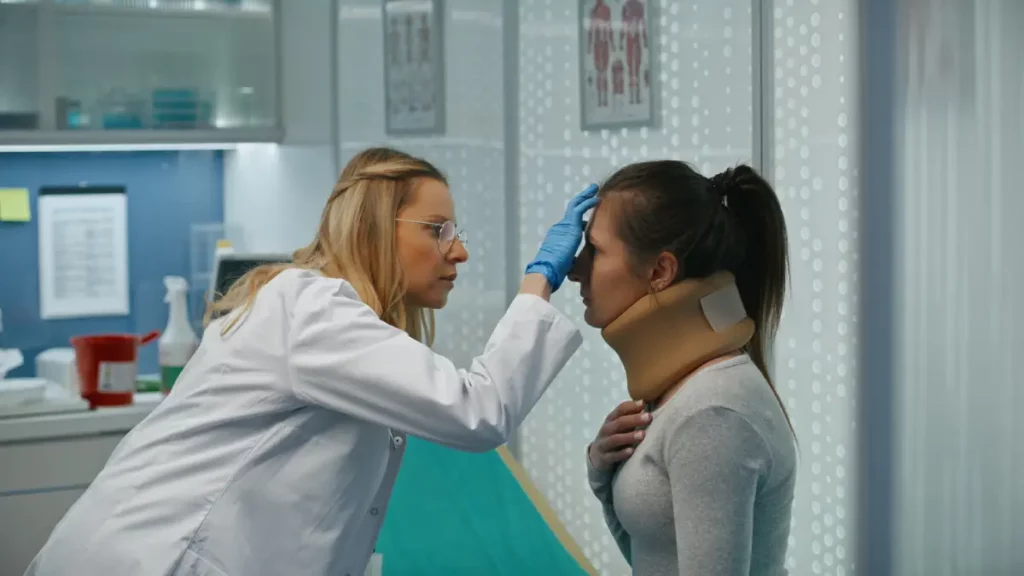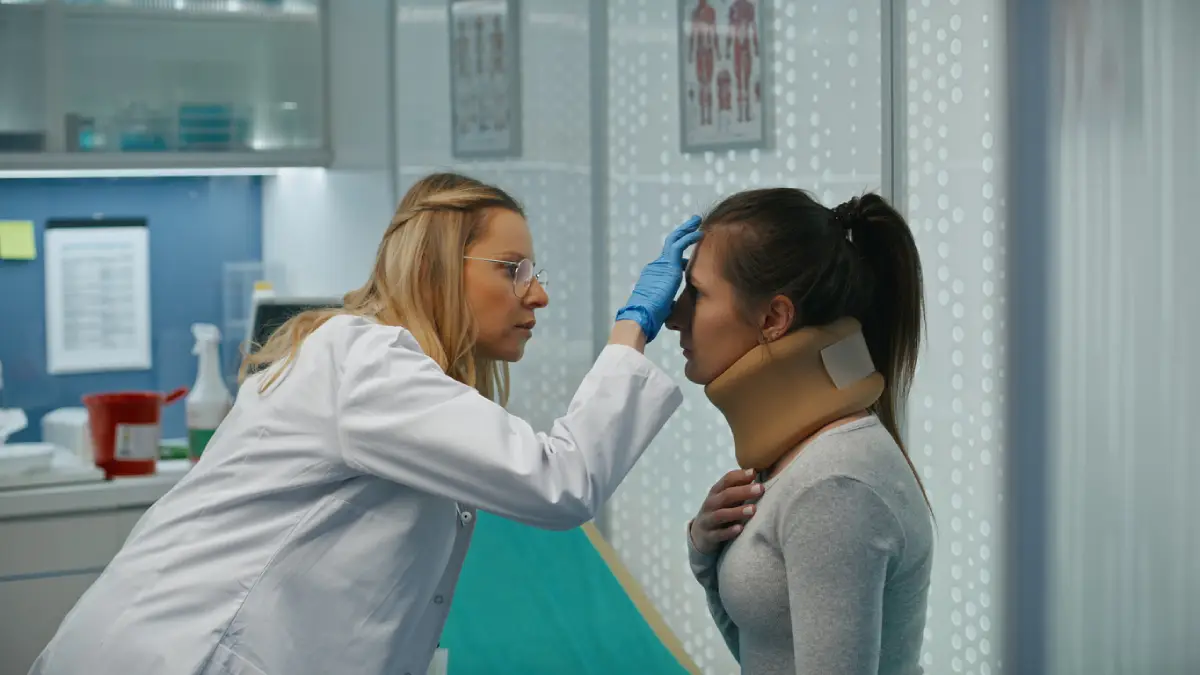
Suffering from post-concussion syndrome (PCS) after a car accident can be a life-altering experience. For many accident victims, the symptoms of a concussion don’t disappear within a few weeks but persist for months or even years after the initial injury, disrupting every aspect of daily life. Understanding the post-concussion syndrome settlement value is crucial for victims pursuing legal compensation.
PCS can stem from a traumatic brain injury (TBI), and in many cases, these injuries result from car accidents. When someone else’s negligence causes your head injury, you may be entitled to financial compensation. We will look into the causes and diagnosis of PCS, explore the many factors that influence settlement values, and explain how to prove your claim. For those seeking dedicated legal support, our team of experienced attorneys is here to help you navigate your concussion brain injury claim with the compassion and expertise you deserve. We are committed to helping our clients through every stage of their personal injury cases.
Understanding Post-Concussion Syndrome and Its Effects
Post-concussion syndrome (PCS) is a complex disorder in which various physical, cognitive, and emotional symptoms persist long after the initial concussion. Although concussions are medically classified as mild traumatic brain injuries (TBIs), the effects of PCS can be debilitating. This syndrome commonly includes ongoing headaches, dizziness, sleep disturbances, light and noise sensitivity, memory lapses, difficulty concentrating, fatigue, irritability, depression, and anxiety. These concussion symptoms persist for weeks, months, or even years, depending on the individual and the severity of the trauma.
The impact of PCS often extends well beyond physical symptoms. Many victims struggle to perform at work or return to their previous level of productivity. Cognitive deficits can impair professional performance and reduce job opportunities, while emotional challenges may strain personal relationships. Routine activities—like driving, reading, or socializing—can become sources of stress or confusion.
In more severe cases, individuals with PCS may require long-term therapy, including neurological rehabilitation, psychological counseling, or occupational therapy. The cost of ongoing treatment, coupled with lost income, creates a significant financial burden. For this reason, early medical care and accurate diagnosis are essential not only for recovery but also for building a strong legal claim.
Common Causes of PCS
Post-concussion syndrome frequently results from car accidents and serious injuries to the head. Even a low-speed collision can generate enough force to cause the brain to jostle inside the skull, resulting in a concussion or more severe brain trauma. Some of the most common scenarios that cause PCS include:
- Rear-end collisions
- Distracted or impaired driving incidents
- Bicycle or pedestrian accidents
- Slip and falls
Other causes of head injuries that can lead to PCS include:
- Slip and falls
- Workplace accidents
- Sports injuries
- Acts of violence
When someone else’s negligence is the root cause of the accident—for instance, a car accident caused by a distracted or drunk driver—the path to legal recourse becomes clear. In these situations, the at-fault party can be held liable for the resulting damages. In such cases, working with a TBI attorney for PCS compensation is essential.
Diagnosing Post-Concussion Syndrome
One of the most significant hurdles in any post-concussion syndrome case is the diagnosis itself. Unlike a broken arm or other soft tissue injuries, a concussion doesn’t show up clearly on a standard X-ray. The PCS symptoms can be subtle, subjective, and may not even manifest for days or weeks after the initial accident. This delay can make it challenging for medical professionals to connect the symptoms directly to the traumatic event, which is why seeking immediate medical attention after any car accident involving a potential head injury is paramount.
Medical documentation is the bedrock of a successful claim. When you see a doctor, be meticulous and detailed about your symptoms, even if they seem minor. This creates a medical record that establishes a timeline and connects your condition to the accident. Key diagnostic steps and evidence include:
- Initial Medical Evaluation: A thorough examination right after the accident is crucial. The doctor’s notes from this visit can be powerful evidence.
- Symptom Journals: Keeping a detailed daily journal of your symptoms—headaches, brain fog, irritability, sleep disturbances, sensitivity to light—can provide a compelling narrative of your suffering and its impact on your daily life.
- Neuropsychological Testing: This specialized testing evaluates cognitive functions like memory, attention, and problem-solving skills. The results can objectively demonstrate the cognitive deficits you’re experiencing.
- Advanced Imaging: While standard MRIs and CT scans often appear normal in PCS patients, more advanced imaging techniques like diffusion tensor imaging (DTI) can sometimes reveal microscopic damage to the brain’s white matter tracts.
A TBI attorney for PCS compensation understands the nuances of diagnosing this complex condition. At DG&G, we work closely with medical experts to ensure our clients undergo the proper diagnostic tests and that their condition is documented comprehensively as we pursue their personal injury claims.
How Much is a Post-Concussion Syndrome Claim Worth?
Determining the value of a post-concussion syndrome (PCS) claim requires a detailed evaluation of both tangible and intangible losses. While it’s true that average settlement amounts can vary greatly, understanding what goes into those numbers can help you set realistic expectations and ensure you aren’t undervaluing your claim.
In California, settlements for PCS typically range from around $30,000 to more than $300,000. However, higher settlements are possible in cases where the injury severely impacts the victim’s ability to work, function, or enjoy life. The variability stems from the fact that no two brain injuries—or lives—are the same.
Key components factored into concussion settlement calculations include:
- Medical Expenses: This includes emergency care, diagnostic testing (MRI, CT scans), specialist visits, medications, physical therapy, occupational therapy, and long-term care.
- Lost Wages and Reduced Earning Capacity: PCS often impairs a person’s ability to work. Your current and projected income loss will be factored in.
- Pain and Suffering: PCS can cause chronic headaches, cognitive dysfunction, and emotional instability. These effects aren’t always easy to quantify, but are deeply relevant.
- Loss of Enjoyment of Life: If PCS prevents you from enjoying hobbies, traveling, or spending time with family, this non-economic damage will be considered.
- Future Costs: The long-term nature of PCS may require ongoing treatment, which must be accounted for in any fair settlement.
Insurance companies often attempt to minimize the value of PCS claims, especially because the symptoms are subjective and hard to measure without visible injuries. That’s why experienced legal representation is essential.
A knowledgeable attorney can ensure your settlement reflects the full extent of your injury, not just your immediate medical bills. They’ll work with medical experts, economists, and other professionals to present a well-supported case that documents every aspect of your losses.
Factors Influencing Settlement Values
There is no single calculator that can spit out the exact post-concussion syndrome settlement value. Instead, the final amount is a result of a complex negotiation process influenced by several key factors. Understanding these variables is essential for setting realistic expectations and for building a strong case.
- Severity and Duration of Symptoms: The most significant factor is the impact the injury has had on your life. A person with persistent, debilitating symptoms that prevent them from working or engaging in daily activities will generally have a higher settlement value than someone with milder, shorter-term symptoms. The strength of your medical documentation and expert testimony is crucial here.
- Total Medical Expenses: This is a cornerstone of your economic damages. It includes not just the bills you’ve already paid but also a well-documented projection of future medical expenses. This could include ongoing therapy, medications, and potential future treatments. Calculating future costs requires expert analysis, which your attorney will arrange.
- Lost Income and Earning Capacity: As mentioned, this is a major component. We calculate this by looking at your past earnings and projecting how the injury will affect your ability to earn in the future. In cases of permanent disability, this can be the largest part of the settlement. The average payout for a concussion after a car accident is heavily influenced by the victim’s profession and income level.
- Strength of Evidence and Liability: A clear case where the other party is 100% at fault will generally lead to a better settlement. If there is shared fault (comparative negligence in California), your settlement may be reduced by your percentage of fault. This is why a thorough investigation by your concussion injury lawyer in San Francisco is so critical.
- Insurance Policy Limits: The settlement is ultimately paid by an insurance company. The policy limits of the at-fault party can cap the amount of compensation available. An experienced attorney will explore all potential sources of recovery, including your own underinsured motorist coverage.
- The Quality of Your Legal Representation: Insurance adjusters are trained negotiators. Their job is to settle claims for as little as possible. Having a skilled and respected personal injury attorney from a firm like Delfino Green & Green on your side levels the playing field. We know the tactics they use and how to counter them, ensuring you are not taken advantage of during a vulnerable time.
The timeline for settling concussion injury claims can also vary, often taking anywhere from several months to a few years, depending on the complexity of the case and whether it goes to trial. Patience, supported by strong legal counsel, is key to achieving a just outcome.
How Long Does It Take to Settle a PCS Claim?
The timeline for settling concussion injury claims varies based on the complexity of your case. Generally, cases can take several months to over a year to resolve. Important factors that affect the duration include:
- Time needed for medical stabilization (so damages can be accurately calculated)
- Willingness of the insurance company to offer a fair settlement
- The amount of medical evidence needed to prove PCS
- Whether the case goes to trial
A well-prepared attorney will aim to resolve your case efficiently while still maximizing your compensation. If your recovery timeline is uncertain or ongoing, it might be advisable to delay settlement until a full picture of your condition is clear.
Proving Post-Concussion Syndrome in Legal Claims
Because the symptoms of PCS are often subjective and not easily visible on standard medical scans, proving the condition in a legal setting presents a unique challenge. The insurance company for the at-fault party will often try to argue that your symptoms are exaggerated, unrelated to the accident, or are caused by a pre-existing condition.
Here’s how a strong case is built:
- Immediate and Consistent Medical Treatment: The first step is to create an undeniable link between the accident, injuries sustained, and your symptoms. Seeking medical help immediately after the incident and consistently following your doctor’s treatment plan is crucial. Gaps in treatment can be used by the defense to question the severity of your injury.
- Expert Witness Testimony: Your personal injury lawyer will work with a team of experts to validate your claim. This can include neurologists to explain the medical science of your injury, neuropsychologists to testify about your cognitive deficits, vocational experts to detail the impact on your career, and life care planners to outline your future needs.
- Detailed Documentation: Beyond medical records, other forms of documentation are vital. This includes your symptom journal, photos or videos from the accident scene, the police report, and contact information for any witnesses.
- Testimony from Friends, Family, and Colleagues: Statements from people who know you well can be incredibly powerful. They can speak to the changes they’ve witnessed in your personality, abilities, and overall quality of life since the accident. This “before and after” picture helps a judge or jury understand the human cost of the injury.
Proving a PCS claim requires more than just stating you have headaches. It requires a meticulous, multi-faceted presentation of evidence that paints a clear and compelling picture of your suffering and losses. This is not a task to be undertaken lightly or alone. The right TBI attorney for PCS compensation will have the resources, experience, and network of experts necessary to build an irrefutable case on your behalf.
Example PCS Settlement Scenarios
To give you a better idea of what to expect, here are hypothetical (not real) examples:
Example 1: A 35-year-old graphic designer suffered a concussion and developed PCS after a rear-end collision. She experienced chronic migraines and memory issues that affected her job performance. Her final settlement: $145,000.
Example 2: A 52-year-old construction worker with PCS lost the ability to work due to severe vertigo and concentration problems. Medical bills and lost wages made up a large portion of the claim. Settlement: $325,000.
Remember, your settlement will depend on the unique facts of your case and the strength of your legal representation.
Why Legal Representation Matters
Handling a PCS case on your own can be overwhelming, especially while dealing with painful symptoms. A skilled attorney can:
- Evaluate the value of your claim
- Gather and present strong evidence
- Negotiate with insurance companies
- Take the case to court if necessary
At Delfino Green & Green, our team is well-versed in handling brain injury cases. We understand the medical and legal complexities of PCS and are dedicated to securing the compensation our clients deserve.
Next Steps for Victims of PCS
If you or a loved one is dealing with PCS after a car accident, here are the first steps to take:
- Seek Immediate Medical Attention: Prompt care creates a treatment plan and documents your injury.
- Document Your Symptoms and Progress: Keep a journal and save all records.
- Consult a Brain Injury Attorney: A lawyer experienced in PCS claims can help you build a case.
- Avoid Quick Settlement Offers: Insurance companies often try to settle low; consult a lawyer first.
Conclusion
PCS is more than a lingering headache—it can affect every corner of your life, from your career to your relationships. When your injury is caused by someone else’s negligence, you have the right to pursue fair compensation. While the average payout for a concussion after a car accident varies, working with a dedicated attorney significantly increases your chances of securing the settlement you need to move forward.
Contact our Delfino Green & Green concussion injury lawyers in San Francisco today to discuss your PCS case, get a free case evaluation, and start the path to recovery.
Disclaimer: This content is for informational purposes only and does not constitute legal advice. For personalized legal assistance, please contact Delfino Green & Green directly.



